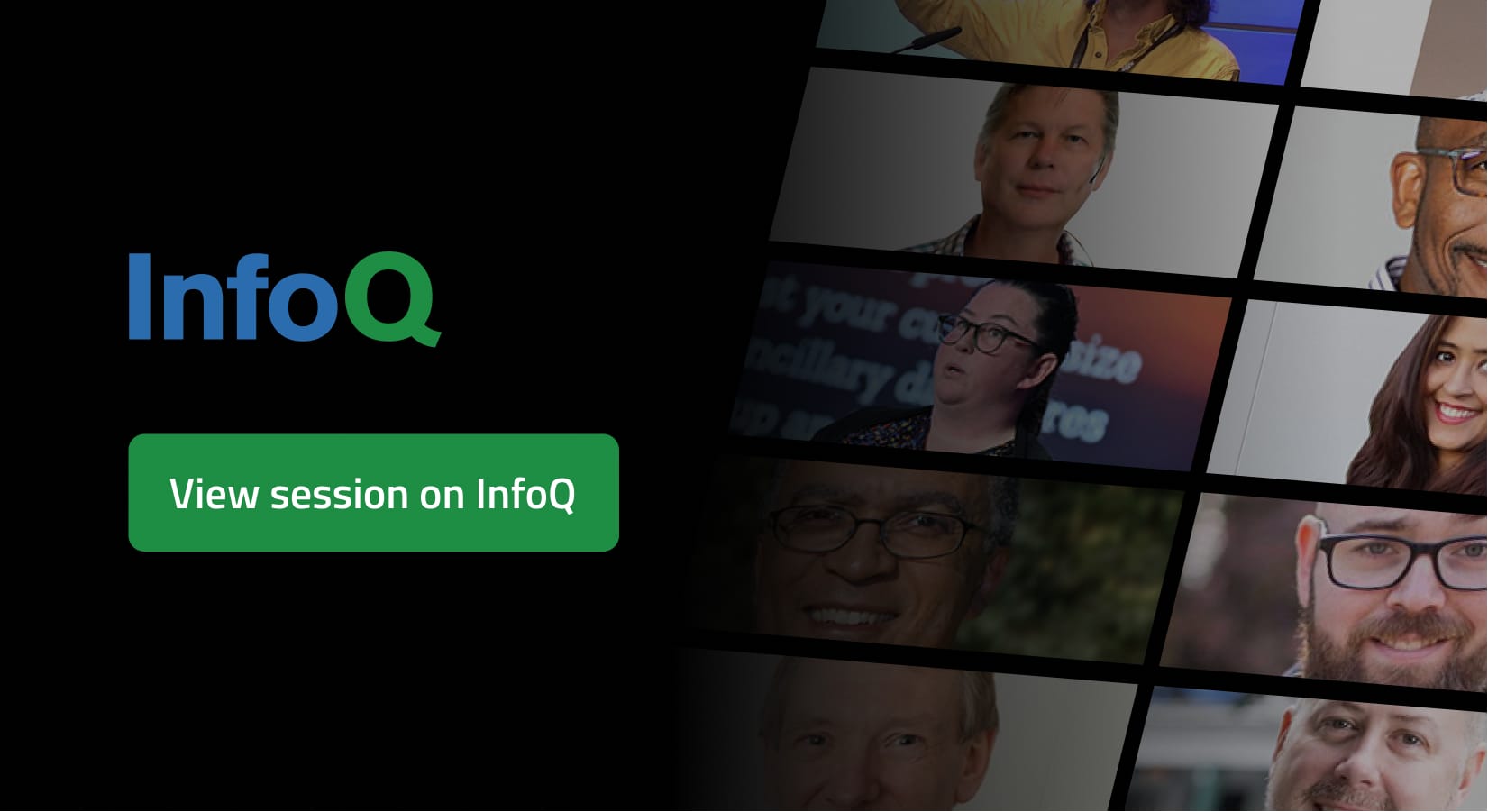Session + Live Q&A
Deterministic, Reproducible, Unsurprising Releases in the Serverless Era
Serverless has many advantages, to reap the benefits from this recent paradigm your application must tackle new challenges.
Testing and traceability introduce some new considerations that may take by surprise even the most seasoned Java developer.
In this session we will explore good practices, tips and lessons learned to make our release to production less exciting than watching paint dry.
Main Takeaways
1 Hear about releasing using the microservices architecture and the need for increased testing.
2 Learn good practices and tips to release microservices.
Ix-chel, what is the focus of your work these days?
Well, right now, I've barely started a new job as a developer advocate at jFrog. And this is after so many years, 20+ years as a consultant. But I have always had this passion for sharing knowledge and trying to spread and talk about best practices and good tools to make our life easier. So I saw this as an opportunity to make one of my passions, my work. So I decided to take it.
And what is the motivation for your presentation?
Well, the new paradigms part of microservices has been here a long time. But there are a lot of companies that have adopted it. I have sat down or talked to different customers that were in the process of migrating their full services into microservices architecture. So we're talking about sometimes thousands, and they're in the process of refactoring and deploying and building. This part of the road, a lot of changes, changes on how we organize our teams, it created more challenges even at the people level. Communication between different teams, designed by contract, testing by contract, things that in the past was not a factor. It was not so evident. And so we have new challenges there, not only when developing, but when we are also testing and figuring out what things went wrong because now we broke down a monolith. Most of the cases into more mobile or small and atomic parts, and now everything is happening at the same time. So figuring out what happened, why, when and how it happens, it is a challenge. So we have developed or there have been a lot of strategies to try to figure out how and there have been a lot of tools that have come into play at Prometheus, Grafana, et cetera, et cetera. And we have now even new iterations of new open source tools that have been built with all the knowledge of this previous generation of tools. So what I'm trying to say here is Java is a good language to go in this direction. We can leverage everything that we have learned and all the stability from our language for this new challenge or strategy or type of architecture. And there is inherent to those challenges, but there are methodologies and tools that can help us over conduct. So that's exactly what I want to tell them. These are the tools that already exist. These are the super advantages. But make sure that you do not miss the new generation and why? Why is this better?
And how would you describe the persona and the level of the target audience?
Well, for me, it has to be both, the project lead or the architect and the developer. The project lead and the architect because they really need to see the pain points, where other teams have encountered more issues, more impedance between their teams, and the developer because at the end of the day we need to solve the problem. So we need to pick the right tool, or at least the tool that helps us in a specific problem at this specific time. So for me, it is both. Awareness and already start thinking about what are the challenges and to start allocating time and effort into these particular ones. We have been talking about testing. You should test, since the beginning? How long? Always. But even with this idea, we should test all the time, to start early, have different types of tests, build your own pyramid, don't forget to test. Sometimes you go out, you still see applications that probably would have benefited if more testing was in place. Now we're saying, remember all these conversations about testing is really important? Well, guess what? We're going to increase the complexity a little bit, so people have to make sure that they are aware that it will be a source of a headache if it's not dealt with correctly. And they have to allocate either more resources, more time, more people or a different strategy.
Speaker

Ix-chel Ruiz
DA, Senior Software Developer @jFrog
Ix-chel Ruiz has developed software application & tools since 2000. Her research interests include Java, dynamic languages, client-side technologies and testing. Java Champion, Ground breaker ambassador, hackergarten enthusiast, Open Source advocate, author, public speaker and mentor.
Read moreFind Ix-chel Ruiz at:
From the same track
Project Loom: Revolution in Java Concurrency or Obscure Implementation Detail?
Wednesday May 11 / 10:10AM EDT
Loom’s promise: simplify concurrency the way garbage collection simplified memory management. It became transparent and almost forgettable. It's an effort to bring lightweight threads to the JVM. Such threads have low memory and scheduling footprint so that you can create millions of...

Tomasz Nurkiewicz
Java Champion and CTO @DevSkiller
Staying JDK: Current in Production
Wednesday May 11 / 11:20AM EDT
At the time of Qcon London, Java will have been on a fast release cadence for almost 5 years. This talk addresses the less often mentioned aspect: adopting JDK upgrades. I will discuss different perspectives towards Java upgrades and possible migration paths. How to plan and execute an...

Andrzej Grzesik
Platform @RevolutApp
Securing Java Applications in the Age of Log4Shell
Wednesday May 11 / 12:30PM EDT
Due to unforseen circumstances, the speaker is no longer available for a Q&A. Please post any questions you have in the Announcement Slack channel.On December 10th 2021, a new critical vulnerability, Log4Shell, was publicly disclosed and make global headlines. It impacted a wide number of...

Simon Maple
Field CTO @snyksec


